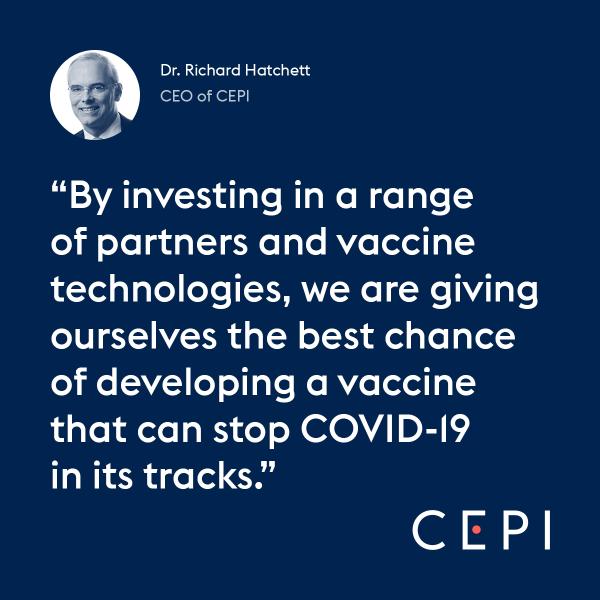
The Coalition for Epidemic Preparedness Innovations (CEPI), a global organisation established to accelerate the development of vaccines against emerging infectious diseases, and the European Investment Bank (EIB), the EU’s bank, today signed a landmark advisory agreement to collaborate on the development of innovative financing schemes to support vaccines development across the globe.
Under this partnership delivered through the InnovFin Advisory programme, the EIB will provide strategic financial advice and support to CEPI and its members (private and public companies and research institutes) on potential financing solutions from the EIB Group and/or external financing options, preparing to deploy large-scale vaccine development projects, making such solutions more readily available around the world. Alongside this signature was the announcement of a European Union-led global Pledging Conference to raise an initial €7.5 billion to end this pandemic, which will begin on 4 May 2020.
By joining forces, the EIB and CEPI will also explore ways to improve the overall financing ecosystem for investments in pandemic preparedness. This may include in due course, the development of a new financing mechanism that would mobilise additional public and private capital. The EIB and CEPI’s cooperation will help to accelerate and facilitate access to funding for a number of vaccine development projects which will benefit from the EIB’s InnovFin Advisory support.
CEPI and the EIB, through InnovFin Advisory - a programme supported by the European Commission to advise companies to structure their R&I projects in order to improve their access to finance - will work together on identifying relevant vaccine development projects. The EIB will provide CEPI and its members with extensive knowledge sharing and support to navigate the financing schemes that exist within and beyond the EIB, in order to bring vaccine projects to life. The Bank offers numerous options for companies looking for funding such as corporate loans, project finance and venture debt. In addition, this collaboration will help to identify potential funding gaps related to vaccine projects, and to explore the need for potential new financial instruments to address such gaps.
EIB Vice-President Ambroise Fayolle said: “Vaccine development is vital in the fight against global infections, including the current coronavirus pandemic. We are pleased to join forces with CEPI to jointly identify vaccine initiatives and suitable funding solutions to get these projects off the ground. The Bank offers numerous options for companies looking for funding to develop the next generation of vaccines in the search for solutions to global disease outbreaks.”
CEPI is an innovative partnership between public, private, philanthropic, and civil organisations, launched at Davos in 2017, to develop vaccines to stop future epidemics. Working with the WHO, CEPI has so far initiated nine partnerships to advance COVID-19 vaccine candidates into clinical testing as quickly as possible.
Dr Richard Hatchett, Chief Executive Officer at CEPI commented: “The COVID-19 pandemic presents the world with an unprecedented challenge. Developing a vaccine that is available to all is going to be the world’s best exit strategy from this crisis, protecting lives and allowing societies to return to normal. I am very pleased to be partnering with the EIB which will help us in our work to develop a vaccine against this deadly disease.”
The EIB is building a pipeline of potential investments in vaccine, treatments and diagnostics for the fight against COVID-19, leveraging on global partnerships with organisations including the European Commission, the WHO, CEPI and others partners, also with the objective to achieve sufficient manufacturing capacity. All this effort is complemented by what the EIB is doing in health and pandemic preparedness both inside and outside EU.
Background information:
The EIB is one of the largest public supporters of innovation in the EU. By supporting cutting-edge innovation and climate action, the EIB helps to make Europe more competitive. Since 2000, the Bank has invested more than EUR 210 billion in innovative projects, R&D, and skills and training. By December 2019 the Bank had provided a total of over €30 billion for healthcare-related projects around the world. The average yearly lending to the sector is €1.4 billion for some 20 projects. In 2019, the EIB helped to improve healthcare services for 12 million people. In addition, the Bank’s loans backed safer drinking water for 10 million people.
About EIB’s Innovation Finance Advisory (IFA): IFA aims to improve the bankability and investment readiness of innovative or complex projects in need of substantial, long-term investments. It also provides advice to improve the investment conditions for access to risk finance for Research, Development and Innovation (RDI) through horizontal activities.
Under Horizon 2020, the EU research and innovation programme for 2014-20, the European Commission and the European Investment Bank Group (EIB and EIF) launched the InnovFin programme, comprising a range of financial instruments and advisory services to help innovative firms access finance more easily. Innovative projects involving public and private partners need to be well prepared and structured before they can be presented to potential lenders and investors. Innovation Finance Advisory assists such priority projects in their preparation of a viable business plan, advising them on the appropriate strategy, governance and financial structure.
Innovation Finance Advisory also reinforces the EIB’s catalytic role in offering financial solutions where public funds mobilise private capital.
About CEPI
CEPI is an innovative partnership between public, private, philanthropic, and civil organisations, launched at Davos in 2017, to develop vaccines to stop future epidemics. CEPI has moved with great urgency and in coordination with WHO in response to the emergence of COVID-19. CEPI has initiated 9 partnerships to develop vaccines against the novel coronavirus. The programmes will leverage rapid response platforms already supported by CEPI as well as new partnerships. The aim is to advance COVID-19 vaccine candidates into clinical testing as quickly as possible.
Before the emergence of COVID-19 CEPI’s priority diseases included Ebola virus, Lassa virus, Middle East Respiratory Syndrome coronavirus, Nipah virus, Rift Valley Fever and Chikungunya virus. CEPI also invested in platform technologies that can be used for rapid vaccine and immunoprophylactic development against unknown pathogens (Disease X).